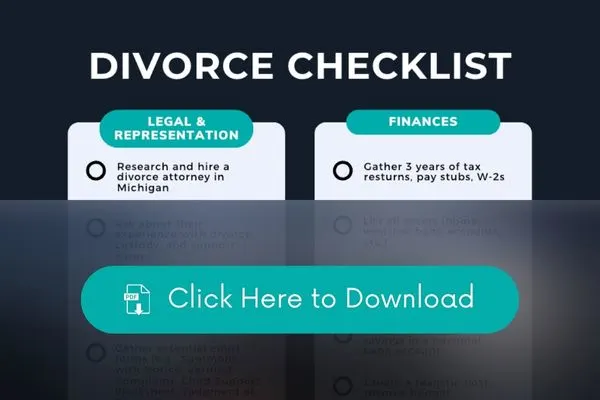Going through a divorce is one of life’s most challenging experiences. It’s emotionally draining and can feel incredibly overwhelming, but with the right preparation, you can navigate the legal process more smoothly. This comprehensive divorce checklist is your guide to getting organized and protecting your future, along with our experienced divorce attorneys.
It’s a tool to help you think clearly and systematically during a turbulent time. While it can’t eliminate the emotional pain, it can certainly help you feel more in control of the practical steps ahead. By taking these actions now, you can lay the groundwork for a more stable and secure life post-divorce.
For a printable version of this checklist, download our free PDF guide for a detailed explanation of each step.

Find a Divorce Attorney
Before filing for divorce, your first and most important step should be to find a qualified and experienced divorce lawyer. This legal professional will be your guide throughout the entire legal process. When you start your search, consider scheduling initial consultations with a few different lawyers. Many firms offer these first meetings for free or at a reduced rate.
Use this time to ask detailed questions about their approach, their experience with families and cases similar to yours, and their fee structure. Understand how their attorney fees are calculated, whether it’s an hourly rate, a flat fee, or a retainer model. It’s also wise to inquire about their communication style.
Do they prefer email, phone calls, or scheduled meetings at their office? A good attorney will not only provide legal advice but also serve as a strategic partner to help you achieve your goals, whether that’s a fair division of property or favorable custody arrangements.
Related: Even if your divorce is ammicable, you should always consult an attorney for an uncontested divorce.
Get Organized
Organization is your best friend during a divorce. Start by creating a dedicated folder or digital drive for all your important legal documents. This will be the central hub for all your divorce records. Think of this as your master document file. Begin by gathering foundational documents like your marriage certification, birth certificates for your children, and any prenuptial or postnuptial agreements.
As you gather information, you will likely uncover more papers you’ll need, so be prepared to keep this folder growing with items like a copy of the divorce petition terms and any other filings. Having everything organized will make it easier for your attorney to assess your case and build a strong strategy, especially when it comes to gathering official divorce records.
Take Care of Yourself
While the legal and financial aspects of the process are critical, your emotional and physical well-being should be a top priority. A divorce can take a significant toll on your health. Make time for self-care activities like exercise, meditation, or hobbies you enjoy.
Don’t neglect your physical health, and be sure to eat well and get enough rest. Taking care of yourself isn’t selfish; it’s essential for maintaining the mental clarity needed to make sound decisions throughout the entire legal process.
Give Yourself Permission to Grieve
Divorce is a form of loss, and it’s natural to feel a wide range of emotions, including sadness, anger, and fear. Allow yourself the space and time to grieve. You are saying goodbye to a life you once knew, and that deserves acknowledgment.
Lean on your support team, which might include friends, family, a therapist, or a support group. This emotional processing is crucial for healing and moving forward. Your support team is there to help you through the difficult times and provide emotional strength.

Keep It Civil
While emotions run high during a divorce, try to keep communication with your ex-spouse as civil as possible, especially if you have minor children. This can be one of the hardest parts of the legal process. Using respectful language and avoiding unnecessary conflict can significantly reduce the costs and stress of the divorce. It can also pave the way for more amicable custody arrangements and a more cooperative division of assets.
If you find it difficult to communicate directly, consider using a co-parenting app or a third-party mediation service. The mediator can help you and the other party reach a civil agreement. Remember, maintaining a civil tone is not about being weak; it’s about being strategic and protecting your long-term well-being and that of your family, including the well-being of any minor children involved.
Gather Financial Information
One of the most extensive parts of the divorce checklist is financial preparation. You need a complete and accurate picture of your finances. This includes everything from bank accounts and retirement funds to credit card statements and tax returns. The more thorough you are, the less likely you will encounter surprises later on.
Start by collecting statements from the past several months to get a full view of your financial history. You should also gather all insurance policies, including health, life insurance, and home or auto insurance.
Don’t wait! Contact our office at (313) 513-1919 for a free consultation.
Determine What You Own
Create a detailed property inventory of all assets. This includes real estate, vehicles, bank accounts, investment portfolios, life insurance policies, and any other valuables. For each asset, note the current value and whether it was acquired before or during the marriage. This process is especially important in the case of a high-asset divorce.
Don’t forget to include smaller items like jewelry, art, and furniture, as these can add up. For real estate, gather appraisals or market value estimates. For vehicles, use a resource like the Kelley Blue Book. For financial bank accounts, collect recent statements.
Determine What You Owe
Equally important is a list of all your debts. This includes mortgages, car loans, credit card debt, student loans, and any other liabilities. Just like with your assets, note who is responsible for each debt. This information is crucial for an equitable division of debt, property retirement funds. To be thorough, pull your credit report to ensure you haven’t forgotten any joint accounts.
Determine Income
Gather proof of all sources of income for both you and your spouse. This includes pay stubs, W-2s, 1099s, and tax returns from the last several years. If either of you has self-employment business income, you may need to gather business financial statements as well. This information is vital for determining child support and alimony.
Build Your Savings
If you are the spouse with less control over the finances, it’s wise to start building your own savings account. This “just in case” fund can help you cover initial attorney fees and living expenses as you separate your money. Even a small amount can provide peace of mind. Consider opening a new account in your name only to begin this process.
Prepare an After-Divorce Budget
Before the divorce judgment is final, start thinking about your post-divorce financial life. Create a realistic budget that accounts for new expenses and your new income. This budget will help you determine if you’ll need spousal support and how much you’ll need.
It should include everything from housing costs and utilities to groceries and transportation. A financial planner can be a great resource in this stage to help you plan for a secure future, ensuring you’re prepared for the costs of living as a single person.
Did you know? Find out more about how much a divorce attorney costs in Michigan.
Find a Place to Live
Whether you plan to stay in the marital home or move out, you need a plan.
- If You Stay in the Home: You’ll need to determine if you can afford the mortgage and all associated costs on your own. You may need to refinance the mortgage to remove your spouse’s name, a process that requires you to have sufficient income and credit on your own. You should start this process early to understand your eligibility.
- If You Move Out: Find a new place to live as soon as you can. This is a big step, and you want to ensure the new place is safe and affordable. Moving can be a chaotic process; consider hiring movers or asking for help from your support team. A strong support team can make all the difference during such a big transition.

Protect Your Credit
A divorce can significantly impact your credit report. Get a copy of your credit report from all three major bureaus (Experian, Equifax, and TransUnion) to understand your current financial standing. Review it carefully for any joint accounts or debt that you may have forgotten about.
Close Joint Credit Accounts
As soon as possible, close all joint credit accounts. If that’s not possible, freeze the accounts or remove yourself as an authorized user. This is an essential step to protect yourself from your spouse’s future debt, which can be a slow and frustrating method of credit protection. A regular mail notification to the credit bureaus is a good first step. Don’t let this be the slowest method of resolving financial ties.
How to Prepare for a Divorce: Woman
For many women, the divorce process can present unique challenges. You may be facing a significant loss of income or a sudden need to manage finances you’ve never handled before. Prioritize financial literacy by educating yourself on your assets and debts.
It’s especially crucial to gather all financial documents, build a separate savings account, and learn how child support and alimony are determined in Michigan. Remember to lean on your support system and prioritize your emotional and physical well-being throughout this challenging period.
Related: Learn about how to prepare for a divorce consultation at Clarity Law.
How to Prepare for a Divorce: Man
Men also face distinct differences and challenges in divorce, particularly concerning custody arrangements and child support. It’s essential to understand your rights and responsibilities. Focus on gathering all legal documents, including those related to your income and assets. Take an active role in the lives of your kids and make sure to document every detail. Being proactive and transparent will help ensure a fair resolution.
Remember that children splitting their time between two homes requires careful consideration and an agreed-upon plan. The divorce petition terms and stipulations can impact how children time splitting is handled. The parents must establish new parenting rules and a clear schedule.
Conclusion
Navigating a divorce is never easy, but by following this comprehensive checklist, you can approach the process with confidence and clarity. The more prepared you are, the better equipped you’ll be to protect your financial future and emotional well-being. From gathering financial records to understanding the divorce petition terms, each step you take today brings you closer to a new, stable beginning. Don’t face this journey alone.
Ready to take the next step? Contact our office for a confidential meeting with an experienced Dearborn divorce lawyer.
